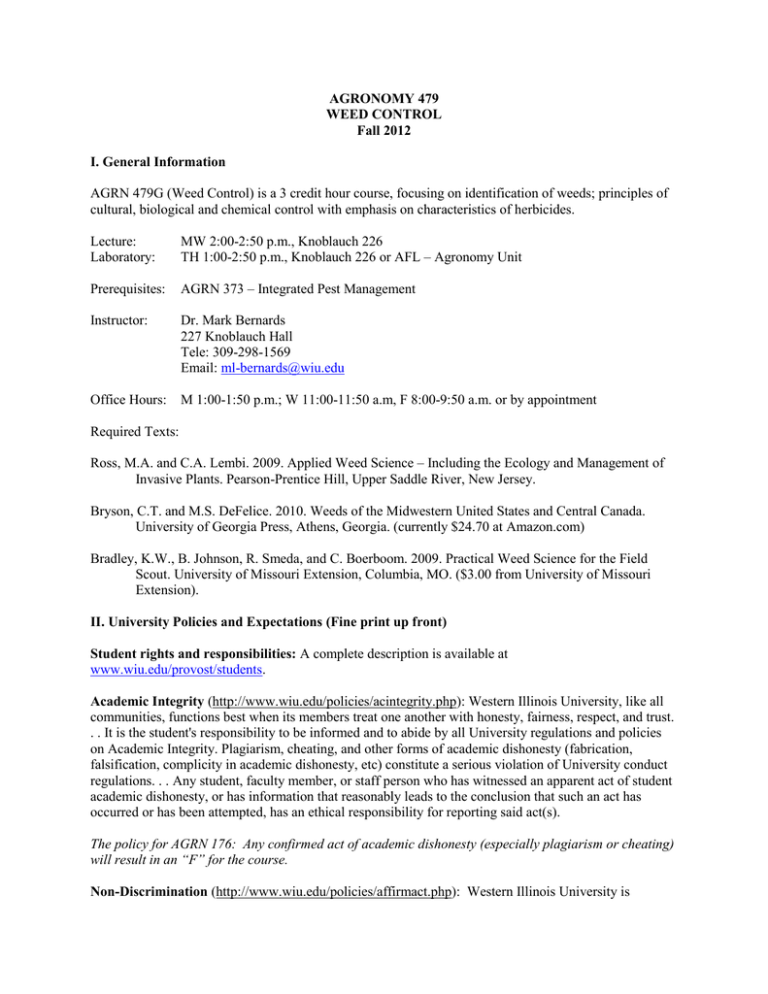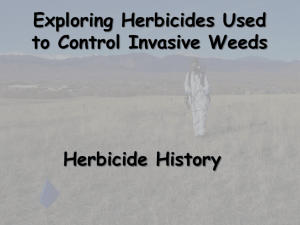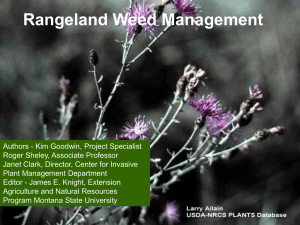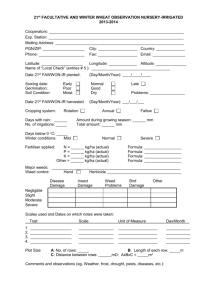AGRONOMY 479 WEED CONTROL Fall 2012 I. General Information
advertisement

AGRONOMY 479 WEED CONTROL Fall 2012 I. General Information AGRN 479G (Weed Control) is a 3 credit hour course, focusing on identification of weeds; principles of cultural, biological and chemical control with emphasis on characteristics of herbicides. Lecture: Laboratory: MW 2:00-2:50 p.m., Knoblauch 226 TH 1:00-2:50 p.m., Knoblauch 226 or AFL – Agronomy Unit Prerequisites: AGRN 373 – Integrated Pest Management Instructor: Dr. Mark Bernards 227 Knoblauch Hall Tele: 309-298-1569 Email: ml-bernards@wiu.edu Office Hours: M 1:00-1:50 p.m.; W 11:00-11:50 a.m, F 8:00-9:50 a.m. or by appointment Required Texts: Ross, M.A. and C.A. Lembi. 2009. Applied Weed Science – Including the Ecology and Management of Invasive Plants. Pearson-Prentice Hill, Upper Saddle River, New Jersey. Bryson, C.T. and M.S. DeFelice. 2010. Weeds of the Midwestern United States and Central Canada. University of Georgia Press, Athens, Georgia. (currently $24.70 at Amazon.com) Bradley, K.W., B. Johnson, R. Smeda, and C. Boerboom. 2009. Practical Weed Science for the Field Scout. University of Missouri Extension, Columbia, MO. ($3.00 from University of Missouri Extension). II. University Policies and Expectations (Fine print up front) Student rights and responsibilities: A complete description is available at www.wiu.edu/provost/students. Academic Integrity (http://www.wiu.edu/policies/acintegrity.php): Western Illinois University, like all communities, functions best when its members treat one another with honesty, fairness, respect, and trust. . . It is the student's responsibility to be informed and to abide by all University regulations and policies on Academic Integrity. Plagiarism, cheating, and other forms of academic dishonesty (fabrication, falsification, complicity in academic dishonesty, etc) constitute a serious violation of University conduct regulations. . . Any student, faculty member, or staff person who has witnessed an apparent act of student academic dishonesty, or has information that reasonably leads to the conclusion that such an act has occurred or has been attempted, has an ethical responsibility for reporting said act(s). The policy for AGRN 176: Any confirmed act of academic dishonesty (especially plagiarism or cheating) will result in an “F” for the course. Non-Discrimination (http://www.wiu.edu/policies/affirmact.php): Western Illinois University is committed to providing equal opportunity and an educational and work environment for its students, faculty, and staff that is free from discrimination based on sex, race, color, sexual orientation, gender identity and gender expression, religion, age, marital status, national origin, disability, or veteran status. Disabilities: In accordance with University policy and the Americans with Disabilities Act (ADA), academic accommodations may be made for any student who notifies the instructor of the need for an accommodation. For the instructor to provide the proper accommodation(s) you must obtain documentation of the need for an accommodation through Disability Resource Center (DRC) and provide it to the instructor. It is imperative that you take the initiative to bring such needs to the instructor's attention, as he/she is not legally permitted to inquire about such particular needs of students. Students who may require special assistance in emergency evacuations (i.e. fire, tornado, etc.) should contact the instructor as to the most appropriate procedures to follow in such an emergency. Contact Disability Resource Center (DRC) at 298-2512 for additional services.” Education Majors: The changes within the state certification requirements go into effect immediately for all of those students who graduate in the spring 2012 and after. You are required to receive a grade of a "C" or better in this course. With the new university +/- grading system, receiving a "C-" or below will require you to retake this course or find a substitute course to meet School of Agriculture graduation requirements. III. Course Expectations and Policies 1. Live the Golden Rule. Treat others with respect and courtesy in your conversation and actions. Turn off and put away all electronic devices during the class period. Class is not the time to read the newspaper or magazines. 2. Show up. Attendance and punctuality is expected. Notify the instructor in advance if you have any reason to miss a class period. A minimum of 24 h notice (email or phone) is required if there is any cause to miss an exam. If you do miss a class period, do not ask the instructor “Did I miss anything important?” It is your responsibility to make arrangements to get the information you missed and to make up any missed assignments. 3. Participate. Be prepared for class discussions by completing readings, taking notes, asking questions, and working effectively with other students on lab and lecture activities. 4. Study. You should plan to spend a minimum of 3 hours outside of lecture/lab each week to adequately learn the material. 5. Complete assignments. Assignments not turned in on the assigned date will have 10% of the total potential points deducted for each day after the due date. The instructor will generally return exams and assignments within 1 week. 6. The use of tobacco is prohibited in Knoblauch Hall, nor is it allowed during laboratory sessions at the AFL. Two dismissals due to disruptive or unprofessional behavior will result in a permanent disbarment from the course and a final grade of “F” will be assigned. IV. Course Objectives At the conclusion of this course you should be able to: a. Identify approximately 75 weedy species, describe their basic biology and list their Latin binomial name b. Explain what factors contribute to the “weediness” of a species c. Explain how weeds cause damage to a landscape and predict potential crop losses d. Identify appropriate non-herbicide techniques for managing weeds based on the biology of the e. f. g. h. i. j. k. l. weed species Describe factors that affect herbicide activity, movement, and fate in soil Describe how herbicides enter, move within, and affect plant growth and development Illustrate why herbicides are selective and why plants become resistant to them Differentiate herbicide active ingredients into the appropriate herbicide mechanism of action Diagnose herbicide injury and symptomology for eleven herbicide mechanisms of action Demonstrate the ability to properly calibrate a sprayer Demonstrate the ability to calculate proper rates for applying herbicides Create a weed management plan for a specific management area V. Grading Probable Grade components Participation Lab quizzes/exams Lecture quizzes Weed collection Scientific article review Weed report/presentation Weed Management Plan Final exam (comprehensive) Grading Scale Percentage 93.0-100 90.0-92.9 87.0-89.9 83.0-86.9 80.0-82.9 77.0-79.9 Grade A AB+ B BC+ Portion 10% 25% 25% 10% 5% 5% 5% 15% Percentage 73.0-76.9 70.0-72.9 67.0-69.9 63.0-66.9 60.0-62.9 <59.9 Grade C CD+ D DF VI. Learning Assessment Participation: A composite of attendance, punctuality, participation during class and accurate completion of laboratory and lecture assignments. Lab quizzes/exams: A quiz will be given most laboratory periods that will review material covered in previous lab sessions. A Weed ID Exam and a Herbicide and Application Exam will also be taken during lab periods. Lecture quizzes: Quizzes will be given approximately every other week and will review material covered in the previous lectures. The quizzes will include multiple choice, fill in the blank, and short essay questions. Weed Collection: Each student will make a collection of 20 weed species and a seed collection of 20 species. The collections will be graded on content and quality. Details will be provided in during a laboratory activity. Scientific article synopsis: The purpose of this assignment is for you to increase your skills in reading and understanding peer-review published articles. You will select an article in consultation with the instructor. Specific requirements regarding the synopsis will be provided later. Weed report: In consultation with the instructor, each student will select a weed species and prepare a report and presentation about that weed. Assignment details will be provided later. Weed Management Plan: The purpose of this assignment is for you to develop a working plan to manage weeds in a well-defined ecosystem. Assignment details will be provided later. VII. Probable Course Calendar Date Aug 20 Aug 22 Lecture Topics What Is a Weed? Plant Systems I Reading Ch. 1 Ch. 5 Aug 27 Aug 29 Sept 3 Sept 5 Sept 10 Sept 12 Plant Systems II Soil System , Quiz Labor Day, No class. Intro to Herbicides Herbicide Uptake and Movement Herbicide Mechanism of Action, Quiz Herbicide Selectivity Ch. 5 Ch. 6 Sept 17 Sept 19 Sept 24 Sept 26 Ch. 8 Pp. 154-162 Pp. 163-181 Pp. 185-191 Pp. 203-208 Pp. 209-225 Suppl. Ch. 12 Oct 15 Oct 17 Herbicide Resistance Reading Scientific Articles Synthetic Auxins, Glyphosate and ACCase-inhibitors, Quiz ALS-, Pigment- and PSII-inhibitors PSI and PPO-inhibitors, Glufosinate Shoot and Root Inhibitors WIU Ag Career Fair Herbicide Fate Dormancy and Seed Banks, Quiz Interference and Competition Oct 22 Oct 24 Oct 29 Oct 31 (ASA) Interference and Competition Ecology and Invasion , Quiz Ecology and Invasion Management Methods Ch. 3-4 Ch. 3-4 Ch. 7 Nov 5 Nov 7 Nov 12 Nov 14 Tillage and Cultivation Management Methods, Quiz Weed Management Weed Management Ch. 24 Ch. 7 Ch. 16-21 Ch. 16-21 Nov 1923 Nov 26 Nov 28 Dec 3 Dec 5 Happy Thanksgiving. No class. Dec 10 Final Exam, 3 -5 p.m., 226 KH Oct 1 Oct 3 Oct 8 Oct 10 Weed Management Weed Management, Quiz Weed Management Weed Management Ch. 12-13 Ch. 14 Ch. 15 Pp. 181-185 Pp. 192-203 Ch. 2 Ch. 2 Ch. 16-21 Ch. 16-21 Ch. 16-21 Ch. 16-21 Date Lab topic (Location) Aug 23 Plant Anatomy &Taxonomy/Weed ID (AFL) Aug 30 Weed Collection/Weed ID (KH 226) Sept 6 Scouting/Weed ID (AFL) Sept 13 Experimental Design/Weed ID (AFL) Sept 20 Weed ID/Herbicide Selectivity (AFL) Sept 27 Weed ID (KH 226) Oct 4 Weed ID/Herbicide Selectivity (AFL) Oct 11 Weed ID Exam (AFL) Oct 18 Labels, Formulations and Adjuvants (Ch. 22, AFL) Oct 25 Herbicide Math (226 KH) Nov 1 Nozzle Selection and Sprayer Calibration (Ch. 23, AFL) Nov 8 Weed Mngt Resources (226 KH) Nov 15 Herbicide and Application Exam (AFL) Nov 29 Troubleshooting (Ch. 25, 226 KH) Dec 6 Final Exam Review, Course Evaluation


